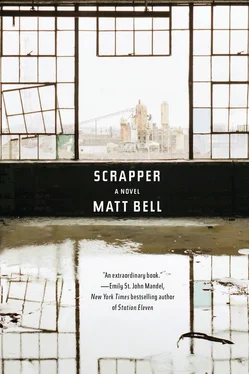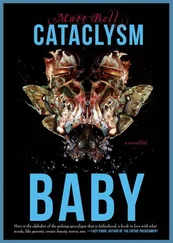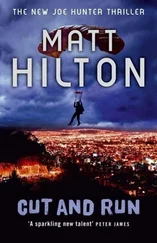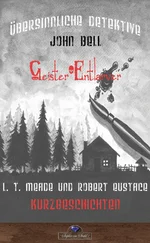There were many places any one animal couldn’t live but nowhere no animal would not. All these animals Kelly had never known: the squat lobster, more amphipods, impossible mollusks. Zombie worms born without digestive tracts. A name for everything, no matter how strange. So many hundreds of thousands of dead whales crashed into the ocean floor they created a migratory path, a way for organisms to move, evolve. If you were a single cell wide, how many cities might one whale comprise, falling blackly through the black water? Another exclusion zone filled with rot, shared by other scavengers. A bowhead whale could live two hundred years, and one hundred years after it died it might at last disappear from the earth, dispersed entirely. Off the shore there were carcasses of American whales as old as America and what did this say for this past century, for what was man-made and had lasted only half as long.
When the show ended the boy stood from the couch and retrieved his backpack, paused by the door. He was nervous but there was something brave in him and Kelly recognized this too. He had come through his own troubles with something similar, an unspoken belief nothing worse would happen next.
Kelly asked, Where are you going? It’s a long way home.
I’m not going home, the boy said. I’m going to my father’s.
Now the boy began to speak, slowly, carefully, his backpack on his shoulders. At first the boy hadn’t noticed his father had moved out. In the first month of the separation, his father had come back every night for dinner, stayed listening to records in the living room until the boy was in bed. He wasn’t there for breakfast but he’d always left for work before sunrise. He’d realized the father was gone only when the father’s things went missing. The books stayed on the shelves because the father didn’t read but one day there was hardly any music left in the house. Certain kinds of food stopped being stocked. The boy hadn’t said anything. He didn’t mention every obvious problem he saw. His parents had separated before what happened but afterward they’d reunited for the photo op, made nice for the cameras. The appearance of normalcy for the return of their boy. Now the cameras were gone and the boy’s father was back in his apartment, didn’t have to pretend to show up for dinner.
This was why the parents hadn’t understood he’d gone missing. They weren’t speaking and both of them had thought the other had the boy.
I’ll drive you, Kelly said. He gathered his keys, found a ball cap and a sweatshirt. He checked his watch. On the way to the truck he called the girl with the limp, offered her a time, then adjusted his arrival into the further future, said all estimates were dependent on weather and traffic. She heard the truck start, asked him where he was going first.
He gave her the details: The boy had come to him. They had spent some hours together. He was taking the boy home.
She said, I don’t know if that’s a good idea.
Be careful, she said. I hope you know what you’re doing.
He gave her the details but what did the details mean. She was the soul of understatement but maybe she understood. Something had begun in the basement of the blue house and this was how it continued. He hung up the phone, maneuvered the truck out of the neighborhood and onto the freeway, moved the truck into the left lane, kept his foot on the gas. There was a joy to going fast and when a grin broke over his face he looked over at the boy, hoping to share it.
The boy’s face crumpled. He cradled his backpack in his lap, hugged it against his chest. He wasn’t crying yet but maybe he would. Kelly reached out a hand, put it on the boy’s shaking leg.
I’m sorry, Kelly said. I forgot you’d been in the truck. I forgot how it might feel to be in it again.
He waited until the boy was calm again and then he removed his shaking hand, put it back against the wheel. The questions should have been hard to ask but somehow Kelly got them out. The truth at higher and higher speeds, acquiring motion, dopplering through the night.
He said, You don’t have to tell me anything you don’t want to.
Yes, I do, the boy said. Because you were there too.
What the boy remembered hadn’t changed. There was no more or no less story than before, when he told it to the heavy detective.
The boy said, My brother was supposed to pick me up in front of my school. We don’t go to the same school anymore but his school excuses first so he’s supposed to be there waiting for me when I get out. But my brother didn’t come and then there were less cars waiting.
My mother used to pick me up but now she was looking for work. My brother used to be late all the time but now he didn’t always show.
I didn’t have a cell phone then, the boy said. I have one now.
The boy said, He isn’t my real brother. My parents aren’t my real parents but I know you know. My parents are separated and they don’t talk and my brother uses their two houses as a way to never go home, by saying he’s always at the other house.
He hasn’t been in our family long, the boy said, putting his head against the steamed window. The boy was quiet for a mile, two miles. An eerie silence complemented his calm speech, too controlled for his age. Snow fell over the pavement, obscured the lines marking the edge of the road. As the miles passed the boy began to speak again. He said he wasn’t telling Kelly anything he hadn’t told the police.
The boy wasn’t confused. This was a repetition of the facts.
He had been waiting for his brother.
He waited until there wasn’t anyone else waiting.
When the brown car arrived, the boy thought it was his brother’s or else he never would have been so close to the curb. The car was the right color and make and model, the right year, a car like the brother drove.
The boy didn’t know if the man in the car was trying to take him or just anyone there waiting. The boy opened the back door, the boy climbed in, sat down, closed the door, and buckled his seat belt. The boy said, The whole time I was doing it, I could see it wasn’t my brother’s car. It didn’t smell like cigarettes and pot. It wasn’t littered with fast-food wrappers. It was spotless and there was no smell and as I buckled my seat belt I saw the man who was driving it wasn’t my brother. He was shorter than my brother and he was wearing a red hooded slicker. In the car the man wasn’t wearing a mask. It was the only time he wasn’t. He wasn’t wearing a mask but he was wearing gloves and as I slid into the backseat he pulled his red hood up.
The boy said, The sound of the child safety locks.
He hadn’t meant to sit down. He hadn’t meant to close the door. He’d been tired or uncareful. Habit took over and by the time alarm arrived it was too late.
Kelly knew this mode too, the maturity in the boy’s voice, the flatness of affect: the shock that outlasted the trauma. What the boy said he remembered most wasn’t the fear but the confusion. The car was the same car his brother drove. The same color exterior, the same patterned fabric inside. At first the boy had thought the brother’s car had been stolen. For a moment, he’d worried about the brother. He couldn’t understand why the car thief would pick him up from school. He hadn’t realized yet it wasn’t the car the thief had stolen but him.
The boy said, The man told me to unbuckle my seat belt, to lie down on the floor. Down where my feet were supposed to go.
I used to call it the pit, Kelly said. When I was a kid.
Yes, the boy said. The pit.
The boy said in the basement he had been frightened of worse but worse had not come. The man made him strip naked so he wouldn’t escape, but after he was naked he was given a blanket, allowed to cover himself. The boy was naked beneath the blanket but the man who took him didn’t touch him. The man wore a hooded red rain slicker and the man didn’t take the slicker off while he sat in the chair beside the bed or while he fed the boy or while he came and went.
Читать дальше












